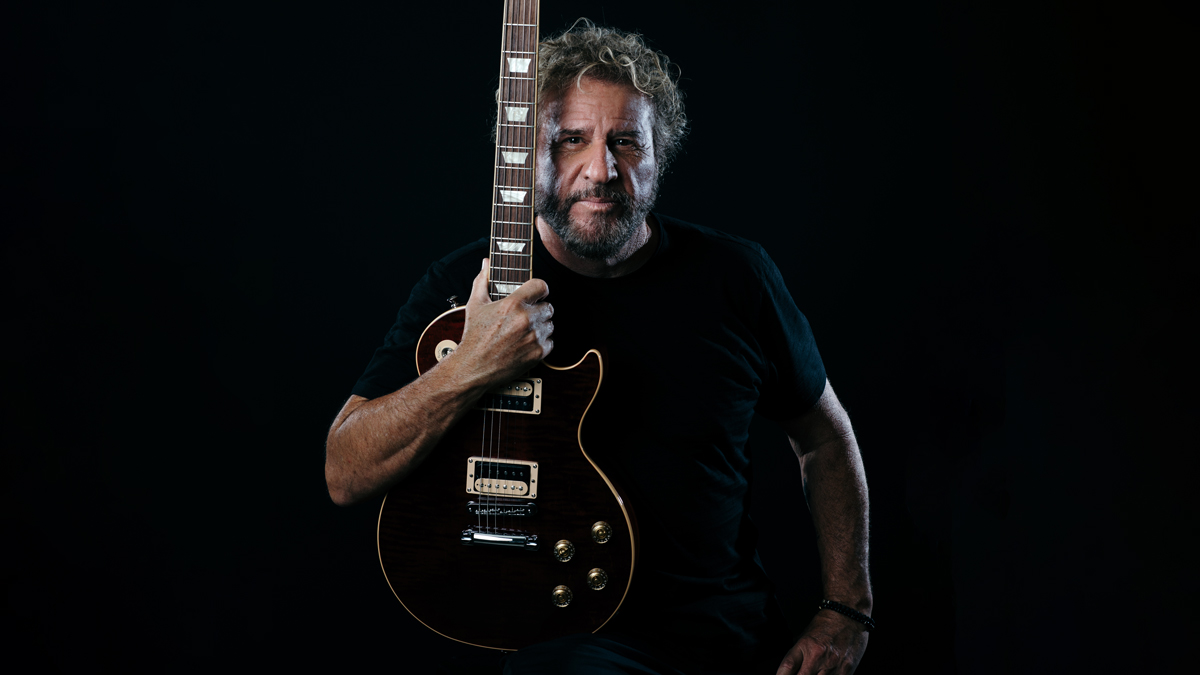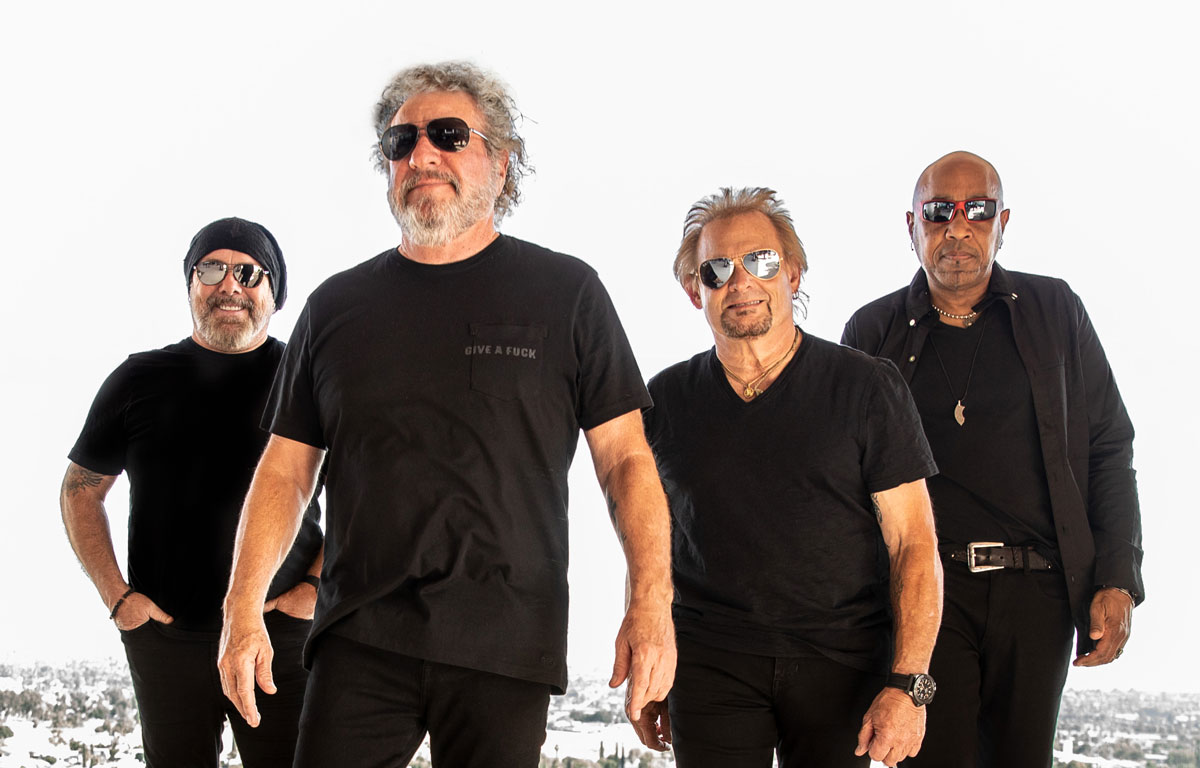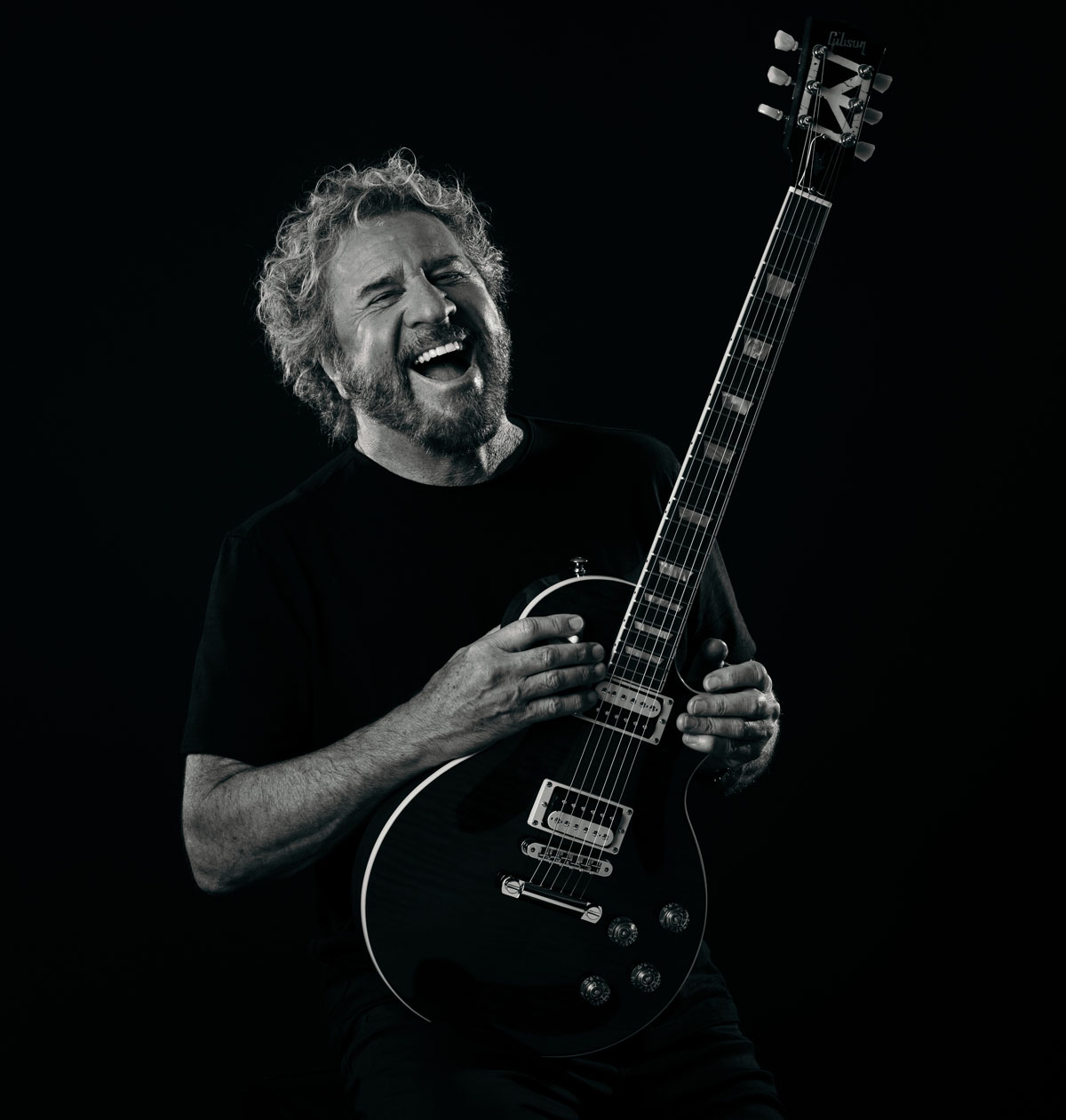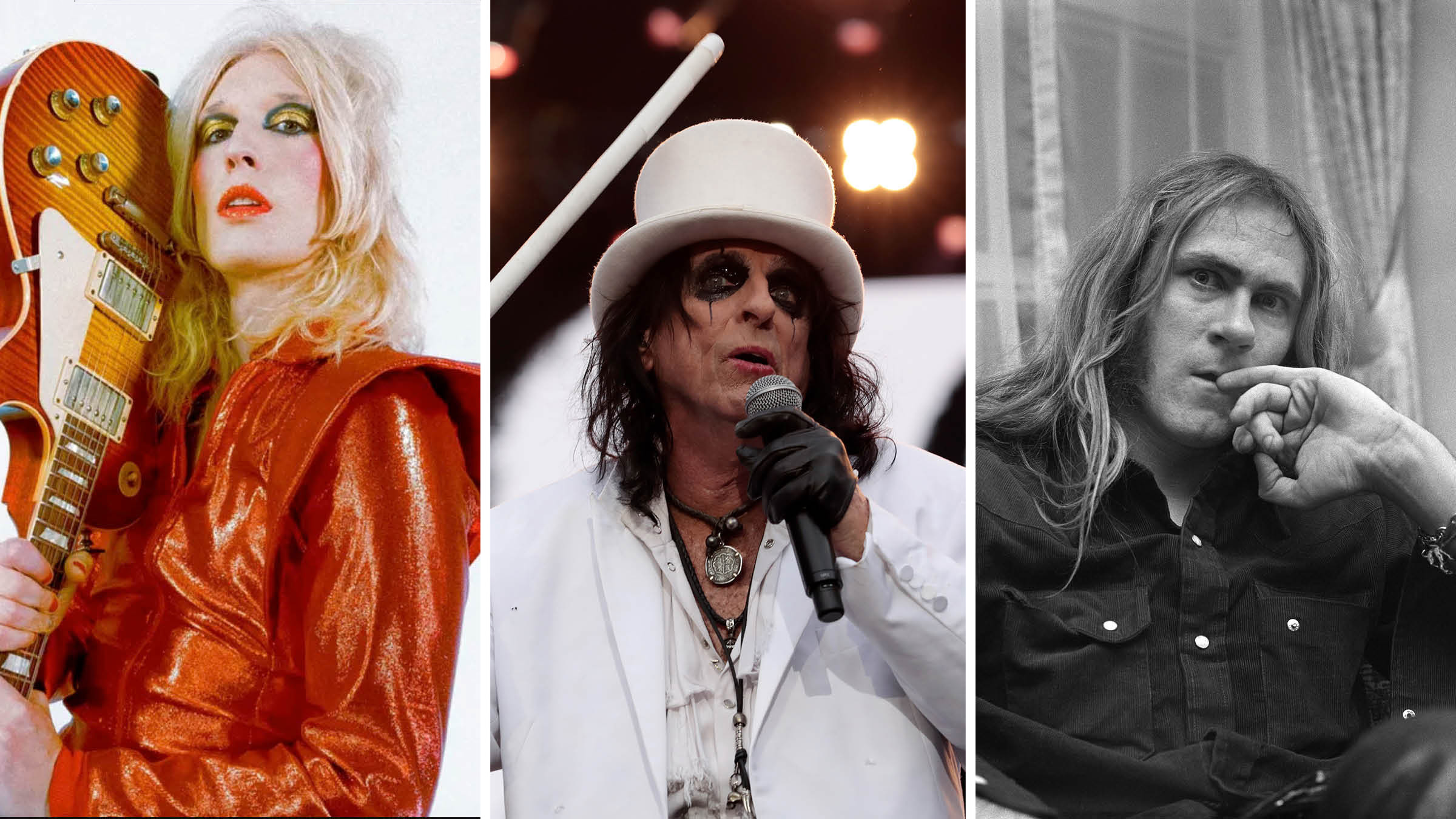Sammy Hagar on his all-time favorite Van Halen album, and why Michael Anthony's bass playing is better than ever on The Circle's new album, Crazy Times
The former Van Halen frontman says The Circle's musical chemistry was so potent the band recorded “two songs a day and were partying by 5 o'clock”

Sammy Hagar keeps it simple. Finding joy in life through music has never been an issue. And as his name scrolls across my cellphone screen, I can't help but crack a smile because, at least for a short while, the stress of the world fell away.
I knew that with Sammy on the line, I was in for a good time. “Hey man, the sun is shinin' by me,” he says. “How's it by you? I'm glad you got to me early; that's when the good stuff flows.”
Like Hagar, if you're one to look on the bright side, surely, you'd agree that the fever dream we share today is often only balanced out by the constant stream of new music. And it seems that the forever young rocker would concur, as he channeled some of his most forward-facing music in years during dark days shrouded in uncertainty resulting in Crazy Times.
“It starts with my vocals, and I'm singing as good as I ever have,” says Hagar. “And I think I write better lyrics now than when I was in Van Halen. I mean, some of those songs were great, but a lot of times, I was clowning around because Eddie and I were always goofing off so much.
“Back then, Eddie and I were doing these crazy acrobatics where I would sing crazy lines, and he'd go nuts on the guitar. When I was in Van Halen, at least in the early days, it was all about having fun. But with this record, the difference is that I didn't goof off and throw silly lyrics into the mix. I hate to say I did that in Van Halen, but I did.”
In many ways, Crazy Times is unparalleled within Hagar's iconic discography. Still, it's bold to compare a record made at this stage of Hagar's career to Montrose, let alone Van Halen. But somehow, Hagar's urgency checks all the appropriate boxes. So, if you're thinking that Crazy Times is just another record, think again. And if you've locked in your end-of-year lists for rock album of the year, reconsider.
“I've never had one quite like this before,” Hagar continues. “And it was intense for me at first because I didn't write during the pandemic. I just saw it as a break, and I said, “Don't stress. You don't have to do anything,” so I didn't.
All the latest guitar news, interviews, lessons, reviews, deals and more, direct to your inbox!
“So, as crazy as it was, I enjoyed the relaxation and allowed myself to reboot for the first time in like 50 years. [Laughs]. And not having that pressure of having to get my voice in shape and rehearsing was great; I didn't realize how much I needed it.”
At 75 years of age, Sammy Hagar knows that his place in the world as an unmitigated rock star is set in stone. With his legacy cemented, Hagar has nothing left to prove, but when it came to Crazy Times, he had an enduring statement to make. And with that statement shined the beauty of Hagar, his music, and his aesthetic; he's forever young and full of enough energy to power all of Cabo Wabo and beyond.
As for The Circle, with Hagar being flanked by the likes of Michael Anthony, Jason Bonham, and Vic Johnson, it's not hard to see why the music is flavorful. But what's most enchanting is the fact that Hagar's energy is seemingly only matched by his passion to create.
“I don't know where this one will land when it's all said and done. It's too early for me to say,” relents Hagar. “But I will say that it's my favorite record that I've made since I don't even know when. At my age and in my position in life, there are a lot of other things I could be doing besides going into some stinking studio with a bunch of guys and slaving, but it wasn't like that this time.
I've made a lot of records in my life with a lot of different people and a lot of different producers, but something special happened here
“So, buy the hype because it's good shit. If it was bullshit, that would be different, but I'm hyping some good shit. I guess this shows I ain't done yet; I still got a lot more to do. I'll rock 'til I'm dead.”
While Hagar remains tightlipped on the ever-swirling Van Halen tribute show rumors – “It’s Alex’s call” – he does have quite a lot to discuss on his new album with The Circle.
Eternally young and with a smile curling over the edges of his perpetually blonde locks, Sammy Hagar dials in with Guitar World to recount the inception of Crazy Times, the evolution of his songwriting from his days in Van Halen, and the importance of Michael Anthony in his personal and musical life.
You've made a lot of great music over the years, but Crazy Times feels incredibly vibrant.
“Man, I agree. I don't know if it was the rubber band effect of being held back by Covid for damn near three years, but this record fuckin' rocks. It's like when we finally let go and got to do something; this record came flying out of me.
“I've made a lot of records in my life with a lot of different people and a lot of different producers, but something special happened here. I felt like I needed to make this record. My mind, body, and soul were all screaming to make this record, and there was no need to fake it; it came out effortlessly.”

From my perspective, these tracks have a very relatable feel to them. What moved the needle in that direction?
“I realized I had all this pent-up stuff, and it came pouring out. It was automatic to the point that I was writing lyrics on the spot. And for the first time in a long time, I felt like I was writing about things relative to everyone.
“Because the whole world was going through the same stuff, I didn't have to write about my life selfishly. I really do feel that I'm the most in touch with reality than I have been in years, man.
“I've been a rock star for a long time, be it coming from Van Halen, Montrose, or all the other stuff, I had painted myself into a bubble. And once you're in the bubble, you start living a different life than the rest of the world. And when that happens, the songs start getting very personal or completely irrelevant to anyone but yourself in your world unless you make things up.”
With this album, it was much easier to let it all out with confidence, and it came quickly. The energy is so high because it came out the first time, and we didn't beat it to death
Have you been in a position where you needed to make things up before?
“I wouldn't say I like doing it, but I've done it my whole life when I've needed another song or two to flesh out a record. It's something where I'd write a love song that's not necessarily coming from the heart, but you gotta do it. You make up some cool rhymes, remember when you were madly in love, and then you get a song. [Laughs].
“But with this album, it wasn't like that, it was much easier to let it all out with confidence, and it came quickly. The energy is so high because it came out the first time, and we didn't beat it to death.
“And that's different from how I've ever made records, except maybe the first two Van Halen records I did. With those, we jammed, and boom, it was done. That's how we did it with this record, and I think it's a testament to the chemistry of this band.”
This seems to be one of the heaviest records you've made in a long time, but that wasn't your initial intention, right?
“I agree with you, especially things like Slow Drain and Childhood's End. But you're right; initially, I was thinking of making an acoustic record, but Dave Cobb – the world's greatest producer time as far as I'm concerned – vetoed that. [Laughs].
“Dave said, ‘I want to make a definitive Sammy Hagar record. I want you to be singing and screaming your ass off like you did in Montrose.’ Even with the ballads, he wanted them to be more like Behind Blue Eyes, and when he started giving me direction, I tweaked my approach and said to myself, ‘This guy knows what he's talking about.’
“I trusted him because it's Dave Cobb, but it didn't take much; I'm an open-minded guy. When I walk into the studio, I'm usually half-cocked; I've never walked into the studio, going, ‘Hey, everything's written. It's all finished. It's all done. All we have to do is one take, and we're done.’ [Laughs]. I don't walk in the studio like that. I always try to leave some room for new ideas.”
I put the guitar down, and suddenly, I was in Montrose and Van Halen again
How did putting your guitar down for this record alter your vocal approach, if at all?
“Well, that's really observant of you because it did make all the difference in the world for my vocals. I put the guitar down, and suddenly, I was in Montrose and Van Halen again. Every time I would do a solo record, I would play the guitar parts with a full band, and I wouldn't even sing my parts until the record was almost done. I would even do background vocals first, then I would go in to do my lead vocals.
“And the result is I found myself uncomfortable because we singers, we're freakazoids, and we're never as comfortable as we seem, and we hate the sound of our own voices, so we get stuck. Honestly, singing is fucked up, man. [Laughs].
“So, by not playing guitar, I was able to focus on singing each song, and I was able to nail a lot of them quickly. I tried some things I usually wouldn't try, and it made for some of the best vocals I've ever done in my life. They're right up there with Montrose and Van Halen.”
This record has the sound of a band recording live in the studio. Was that the case?
“Yeah, man, we did. But the people in that band have to be damn good to be able to do that. And the musicianship in this band with Jason [Bonham], Mikey [Anthony], and Vic [Johnson] is off the charts. And when you've got that level of musicianship, all you have to do is let the creativity take over.
“But if you've got lousy players, somebody's gonna fuck up every take, and you're gonna have to overdub their parts or keep going until everybody gets it right. I've been in the studio with people that take four or five days to do one song. But for this record, we did two songs a day and were partying by five o'clock. [Laughs].”
Many would attest to the musical chemistry of Van Halen. But I would wager what you share in The Circle rivals that.
“Oh, for sure. The chemistry in The Circle is unique because we all grew up on the same music. When one of us brings up a song like Won't Get Fooled Again, we all know what we're talking about. We don't have to explain anything, and we don't have to argue. We all carry the same reference points, which helps us stay on the same page.
Eddie played lead, rhythm, melody, and in some ways, the bass line all at once because he was just a master
“But as far as rivaling Van Halen, I cannot drive this point home enough: Jason Bonham plays exactly like his dad. I never played with his dad, but I've seen Led Zeppelin so many times, and Jason has the goods. When Jason plays, you close your eyes, and you're hearing his pop play.
“And Alex Van Halen: all he ever wanted was the John Bonham drum sound. With every producer, Alex would say, ‘I want my drums to sound like When the Levee Breaks. I want to sound like Bonham.’
“So, you've got Jason Bonham on drums, and then you've got Michael Anthony, who plays better now than he ever played in Van Halen, and you've got Vic Johnson, who is an absolute maestro on guitar.”
Why do you feel that Michael plays better now than with Van Halen?
“Because in Van Halen, Eddie was so busy with the way he played guitar that there wasn't much room for Mikey to do anything. Eddie played lead, rhythm, melody, and in some ways, the bass line all at once because he was just a master.
“So, Mikey rarely got to stretch out, but the truth is that he’s up there with John Paul Jones, John Entwistle, Geddy Lee, and Jack Bruce, but he never got to show it with Van Halen. But now, we've got Mikey off the leash, so we get more from him than we ever got when he was in Van Halen.”

Michael's background vocals on this record are front and center. Was that intentional?
“Yeah, it was. We knew we wanted the classic Van Halen backing vocals. And Mike sings just the same as he did back then, so we totally embraced that. We tried to use every trick Van Halen would use in the studio for the background vocals, but we couldn't find the sound.
“So, I called Ted Templeman in the middle of the session to ask how he made them happen on those classic Van Halen albums. I remember saying to Dave, ‘How are we going to get those backing vocals down? I want Mike to sound like he did on Runnin' With the Devil and Top of the World.’
“And Dave said, ‘I don't fucking know, man. We're not getting it. Can you call up Ted?’ So, I called up Ted, he gave me his formula, we went in, and boom, we had Mikey's vocals. And with those vocals, we have an album rivaling Van Halen. I genuinely believe that.”
Mike and I are cut from the same cloth. Eddie hated it, would get mad on stage, and called it stupid, but we had our inside lingo and were always very close
How do you measure the importance of Michael Anthony on you personally and musically?
“Mikey is like my brother from another mother. So much so that back in the early Van Halen days, Eddie would get all jealous. Because Mike and I would get into these soulful conversations for hours, and Eddie would be on the outside looking in.
“And this was when we were all getting along great, not towards the end when our marriage fell apart. But even in the early days, Eddie would say, ‘Hey, I wanna hang out like you and Mike do.’ And I was like, ‘Cool, man. Let's do it. So, what's the problem?’
“The way it was in Van Halen was Eddie and Alex would get together and do their family thing. And Mike and I would always be the ones that would get tacos and margaritas and talk about life when we were on the road. And in the end, when we were arguing, and Van Halen was falling apart, me and Mike had our own plane because they were trying to keep Eddie and me apart.
“I guess Mike and I are cut from the same cloth. Eddie hated it, would get mad on stage, and called it stupid, but we had our inside lingo and were always very close.
“And that's accented by the magical sound of his background vocals layered over my lead vocals. It's a unique sound that can't be described and that I've never had with anyone else.”
I can see that this record means a lot to you. I know it's early, but how do you measure its importance as you move forward?
“When I think about it, I get goosebumps. I know that it's high up there, and I have this feeling that it's gonna stand the test of time. Lyrically, I don't see it having a problem holding up for a long time because there's no trash on here.
“The first Montrose record is a massive landmark in my life because it's held this test of time. You know you're in good shape when you kick off a career with a song like Rock Candy. [Laughs].
For Unlawful Carnal Knowledge is my favorite Van Halen record. I think it's even better than 5150
“And then you've got the Van Halen stuff which, for me, comes down to For Unlawful Carnal Knowledge. That's my favorite Van Halen record. I think it's even better than 5150 because the writing, vocals, and the way the band was playing tops it. So, I'll have to let someone else shuffle the deck with Crazy Times because I'm too close to it.”
I know you're a man who loves a good cocktail. So, what's your recommendation for listeners to enjoy while they listen to Crazy Times, Sammy?
“I love it! [Laughs] You'd have to start with one good shot of Tequila Blanco. [Laughs]. And then go in and make yourself a nice margarita. And that would be one ounce of fresh lime juice, one ounce of triple sec, and a little squeeze of an orange slice. Then squeeze some fresh orange juice in, add about two ounces of Santo Tequila Blanco, and shake the crap out of it.
“After that, lightly salt the rim, sit down, and listen to the record. And when you get a break, you might want to go and do another shot and mix yourself up just one more of those margaritas.
“So, when you're finished, you'll have two margaritas and two good shots in you, and you'll be feeling good. So good that you're gonna say, ‘You know what? I'm gonna play this fucker again.’ [Laughs]. The idea of drinking my booze while listening to my music, I'd say that's a prescription for a good time if I ever heard one.”
- Crazy Times is out now via Universal Music Enterprises.
Andrew Daly is an iced-coffee-addicted, oddball Telecaster-playing, alfredo pasta-loving journalist from Long Island, NY, who, in addition to being a contributing writer for Guitar World, scribes for Bass Player, Guitar Player, Guitarist, and MusicRadar. Andrew has interviewed favorites like Ace Frehley, Johnny Marr, Vito Bratta, Bruce Kulick, Joe Perry, Brad Whitford, Tom Morello, Rich Robinson, and Paul Stanley, while his all-time favorite (rhythm player), Keith Richards, continues to elude him.

